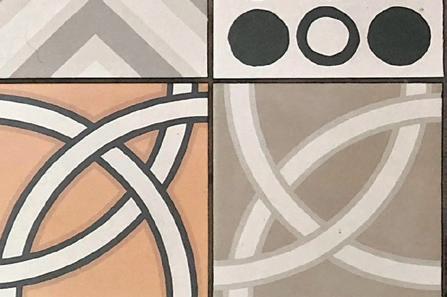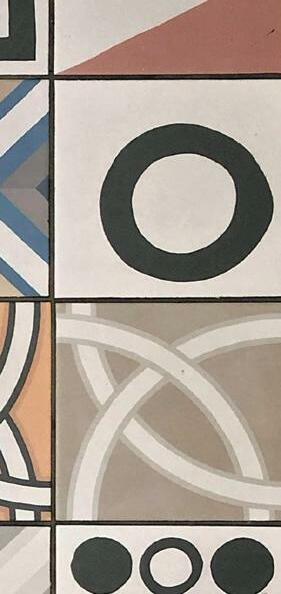




Despite a recent minimum wage increase in Ontario, Toronto Met ropolitan University (TMU) stu dents say the provincial government should do more to help them get by.
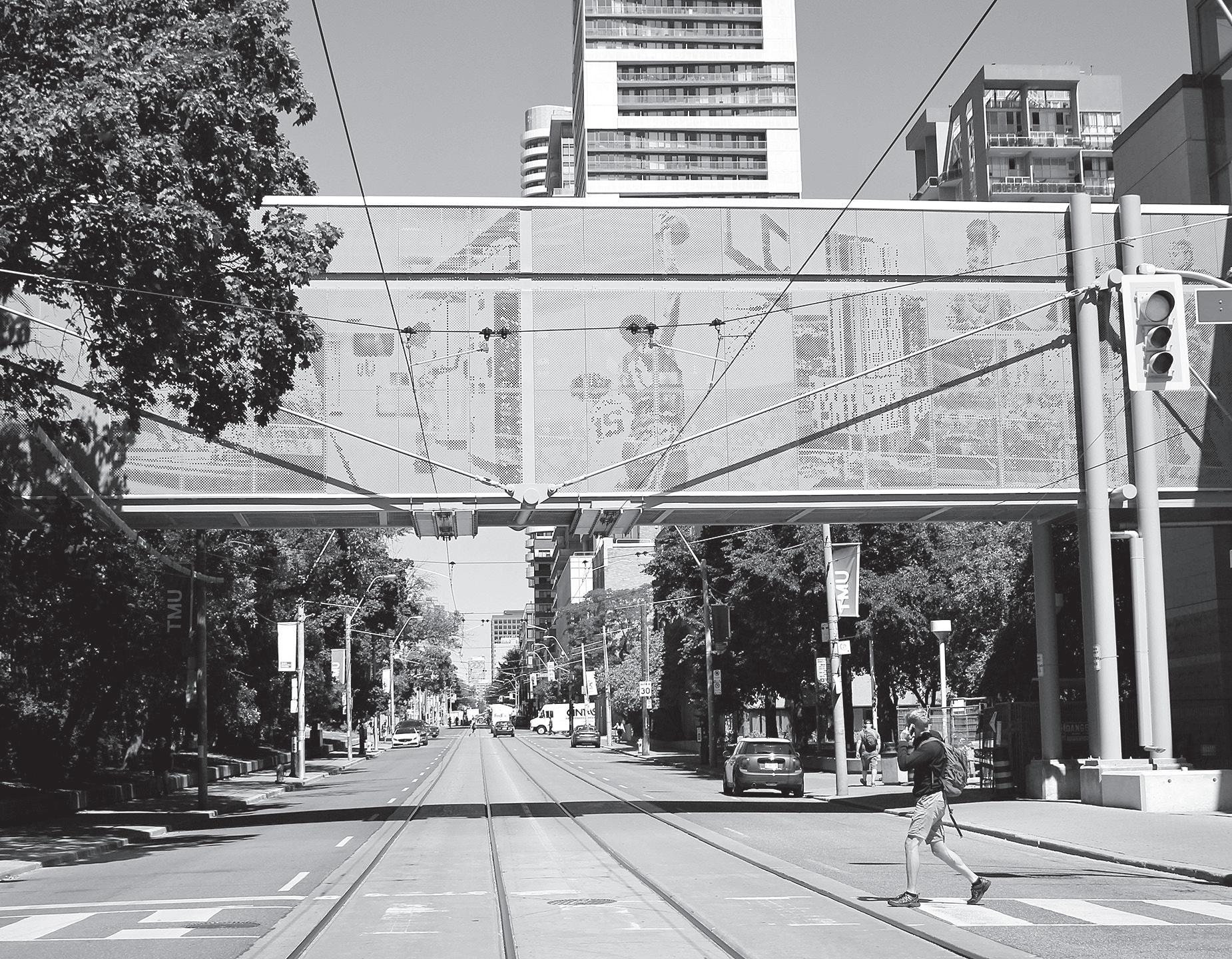
The general minimum wage went up by $0.50 from $15 to $15.50. The increase was announced back in April and took effect at the begin ning of October.
In a news release, the province said the minimum wage increase is intended to help workers deal with inflation. In the announcement about the wage increase, Ontario Premier Doug Ford said, “Wages haven’t kept up with the increas ing cost of living, making it harder than ever to make ends meet.”
“[Ontarians] deserve to have more money in their pockets and the increase we’re announcing today is one more way we are delivering for our workers,” said Ford.
The current government also froze the general minimum wage at $14 from 2018 to 2020.
While students welcome the new hourly wage, they say it’s still not enough to cover their costs of living.
One of these students is Rahul Vankwani, who is in his second year of computer science at TMU. He moved to Toronto this year and ini
tially struggled to find the right job. He currently works at the Ram in the Rye and Oakham Cafe. “I work 10 to 15 hours a week collectively but that isn’t enough to cover my expenses,” he said.
Vankwani said he turns to his family’s support and Guaranteed Investment Certificates (GIC).
A GIC is a low-risk investment that allows consumers to give their money to a financial institution for a set period of time in exchange for earning interest on that amount during that term, according to the Canadian Bankers Association.
“Even if my rent is $800, working 10 to 15 hours would leave me with barely any money to meet other ex penses such as groceries and trans portation,” said Vankwani.
First-year medical physics student Alishba Mobeen said while she’s happy to see the general minimum wage increase, she believes it should be more to reflect the cost of living in a city like Toronto.
“Definitely more than $18, not $15.50. Maybe around $20,” Mobeen said on what she thought the mini mum wage should be.
Mobeen uses what she makes from her job to pay for transpor tation, textbooks and food. While what she brings in from work is good enough for her, she said
she believes “It’s [general minimum wage] not good enough if people have to support other people or fam ilies back home.”
According to Statistics Canada, in flation rose 6.9 per cent from Sep tember 2021.
Jason Heath, a financial planner and managing director of Object Financial Partners, said since the general minimum wage is simply tied to inflation and not other fac tors such as location, the provincial government may need to re-con sider if it is enough to cover the costs of workers.
“The cost of living in Toronto is significantly higher than other places such as Timmins or Pem broke so it would be ideal to set minimum wage regionally,” said Heath. “In Toronto, $15.50 won’t take you too far.”
To save money, Heath sug gested for students to look into cost-effective alternatives. “Surviv ing on minimum wage is tricky. It does depend a lot on whom you live with—family, roommates or alone,” he said. “But look into what areas you are spending the most on and see where you can find less ex pensive alternatives.”
Recent data from Statistics Cana da showed prices for food purchased from stores grew 11.4 per cent from
Heath suggested using a meal plan whenever possible and freezing food before it goes bad. “It’s tempt ing to buy pre-cut salads but avoid ing them is best since those tend to be more expensive than individual items,” he said.
Heath also suggested travelling to get your food rather than having it delivered to your home.
“It’s getting easier to have food delivered wherever you are but takeout is more cost-effective.”
While the current government said they are raising Ontario’s mini
mum wage to combat the rising cost of living, they started their first term in office back in 2018 scrapping a planned minimum wage increase from $14 to $15 an hour by the for mer Liberal government that was set to begin in January 2019.
According to Heath, setting a bud get and following it can go a long way in helping students with their financ es. “As university students, you aren’t expected to not enjoy yourself—that’s unrealistic,” said Heath. “But it’s about trying to find a balance.”
Toronto Metropolitan University (TMU) international students ex pressed excitement over the tem porary removal of the international student work limit.
Starting Nov. 15, the federal government will lift the previous 20-hour-per-week work limit for international students on off-cam pus work while classes are in ses sion, according to the government’s press release.
The removal of the limit, in ef fect until December 2023, is to combat the labour shortage the country is facing, according to the press release.
Second-year accounting and fi nance international student Pavit Sethi said he is pleased by the change.
“I would love to work more than 20 hours; I could work for more time to spend on expenses.”
Riya Shah, an international stu dent in her second year of law and business, said the change is helpful especially because of high interna tional student tuition fees.
“It’s going to be a major help to cut down on our living expenses and oth er costs which we pay by ourselves.”
International student tuition at TMU can range from $31,749 to $38,472, according to TMU’s web
site. Domestic tuition fees for stu dents range from $7,050 to $11,986.
First-year masters in digital me dia student Sarosh Chopra said as an international student himself, the change offers all international students a great opportunity to get ahead. “[We can] earn more money, get more experience and be on a fair playing field with local students.”
Usha George, the academic di rector of the TMU Centre for Im migration and Settlement said the change can prevent students from being exploited for working long hours with no protections.
“Many of the students [work] more than 20 hours and their em ployers exploit them,” George said. “This change removes the underthe-table discussions and allows them to gain good work experience with protections.”
One Voice Canada, a non-profit organization that focuses on bridg ing gaps between the local commu nities and international students, said labour exploitation is seen as a common issue among international students, according to their website.
In a 2021 study from the organiza tion, 25 per cent of the requests for assistance from international students were related to labour exploitation.
Mehrunnisa Ahmad Ali, an im migration and settlement professor
at TMU, said international students often work more as they have in creased expenses—such as paying for English language lessons.
“So, of course, they will try to work longer hours,” she said. “That could jeopardize both their health and well being and possibly also their academic performance. But the thing is that if we don’t give them the opportunity to work more than 20 hours, then they are going to be really struggling.”
A 2022 Academica Forum study found that almost 80 per cent of respondents said they were “con cerned” or “very concerned” about paying for their education; while 55 per cent of Canadian interna tional students who responded were at risk of developing depres sion while 50 per cent were at risk of developing anxiety disorder.
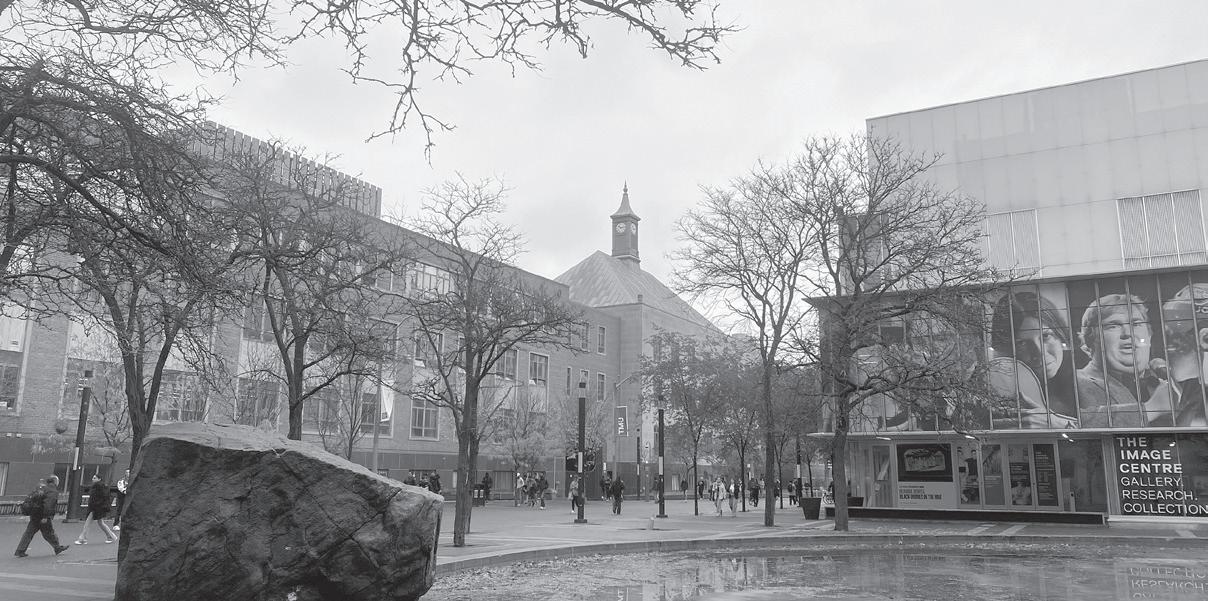
“Oftentimes, their families have made big investments, meaning they need to work to survive here,” said Anna Triandafyllidou, Canada Ex cellence Research Chair in Migra tion and Integration at TMU .
While some students and faculty members expressed excitement, the decision to temporarily lift the 20-hour work limit was also met with criticism.
“I am a bit worried. Many stu dents will definitely jump at this op
portunity, but how will they man age to balance their jobs with their academic work?” said George.
John Shields, a TMU profes sor and expert in immigration and settlement said international students aren’t getting the sup port they need. “We have an obli gation to these students,” he said. “We shouldn’t just be using them for economic advantage—we need to give back and make sure that they’re being supported.”
He said allowing students to ac cess settlement services and receive the help they need for free would be a good place to start.
George advised that the commu nity should focus on “giving them adequate information and orienta tion to Canadian life and work.”
Ali also stressed the importance of
offering more language support, urg ing more initiatives to teach academ ic English and not just conversational English. “We need to ensure stu dents are able to write and commu nicate in academic English which is what they are going to need in university. Casual spoken English is not sufficient for the work we as sign,” she said.
Although Sethi said he hopes for more support for international stu dents like himself, he said the tem porary removal is a step in the right direction and gives him and other stu dents the chance to be independent.
“Everyone knows taking out your own expenses by yourself is a very great feeling for you. You just left your home country and now you’re dependent on yourself, and I feel pretty proud now that I can do that.”
24/7 counselling services, according to the presentation.
Third-year entrepreneurship stu dent Shak Qalandari, who attended the town hall, is unsure how accu rately the university is identifying key stressors for students.
For example, he said students are largely anxious about the pressure to find employment.
Funding should go toward pro grams that connect students with employment opportunities, he said.
“Right now, students feel like they’re just on their own,” Qalan
“Come to class, do the exams and then we don’t care what’s going to happen to you.”
Qalandari said TMU should pro vide “hardcore numbers” about how many students have benefited from wellness services so far.
Abeer “Makes Moms Cry” Khan News
Edward “Shared Location ” Djan
Thea “THE Moment” Gribilas
Prapti “Extraordinaire ” Bamaniya
Photo
Jes “Wednesday Adams” Mason
Vanessa “TIRED” Kauk
Peyton “Please Sleep” Keeler-Cox
Online
Alexandra “Run For Fun” Holyk Abby “Perfect First Draft” Hughes Features
Mariyah “Tide Pen” Salhia
Stephanie “Eventful First Day” Davoli
Madeline “Extremely Specific Costume” Liao
Many students at Toronto Metro politan University (TMU) are against a proposed increase to the student wellbeing fee which will be voted on this week in a student referendum.
If passed, the student wellbe ing fee will increase from $3.93 to $38.83 every semester for all fulltime undergraduate and graduate students. The fee will be adjust ed for students taking part-time course loads.
Voting will be open from Nov. 1 to Nov. 3 on the my.ryerson portal.
Collected funds will go toward constructing a student wellbeing centre on campus, according to a town hall meeting in the Sheldon & Tracy Levy Student Learning Cen tre (SLC) on Oct. 25.
The centre, planned to open in fall 2025, will centralize existing wellness services, including the Medical Centre, Academic Accom modation Support (AAS) and the Centre for Student Development and Counselling, according to the referendum’s website.
Third-year early childhood stud ies student Anson Hung thinks he will vote against the fee in the refer endum. He said he doesn’t personal ly use the university’s mental health resources often and he doesn’t want his tuition fees to increase.
“If the school is trying to improve students’ mental health and pro mote mental health awareness, it shouldn’t be on the students,” Hung said. He said the school should fund that in other ways.
Shayna Sule, a first-year business management student, had similar concerns about the proposed fee. Though she is still debating her vote, she said the increase “is not… rather exciting,” on top of her inter national student tuition.
$38,472 according to TMU’s web site. Domestic tuition fees for stu dents range from $7,050 to $11,986.
In an email to The Eyeopener, Jen McMillen, vice-provost, students said the fee was calculated with stu dent input from focus groups, sur veys and a student referendum com mittee that discussed “the future of wellbeing at TMU” and the concept of the wellbeing centre.
During the town hall, McMillen said the fee increase would be a “really good return investment” for students.
already in place rather than making a whole new building?” she said.
Simon added that if she was still a student, the prospect of an addi tional fee would impact her sup port for improved campus mental health services.
“The reality of it is that I can’t af ford to pay that $30 extra, because that could be lunch, that could be travel money,” she said. “That could be anything else.”
Psychology student Emily McK innon said she sees only positive reasons to vote yes. As a first year student, she said she hasn’t had much experience with the school’s mental health services.
Still, she said everyone can benefit from having access to counsellors on campus.
Based on a 2021 Front Psychol study, the COVID-19 pandemic has increased post-graduation uncer tainty and job anxiety.
According to a 2022 study in Healthcare (Basel), a university can im plement job-seeking programs and a counselling centre to alleviate under graduate employment anxiety.
Sheryl Boswell, executive di rector of Youth Mental Health Canada, a charitable non-profit organization, said the pandemic has challenged the idea that only a small number of people are affected by mental health challenges.
“We opened up that conversation and we realized at some point all of us struggle,” she said. “It’s part of the challenges in living.”
Boswell said universities should consider how they can build com munity supports for students and staff that build mental wellness.
Christina “EIC Soon” Flores-Chan Communities
Asha “Cat Sitter” Swann
Gavin “Tinkerbell” Axelrod Jack “Lore” MacCool
Zarmminaa “En Route” Rehman
Sonia “Practicum” Khurana Youdon “Cinnamoroll” Tenzin
Nishil “Fuck Routing” Kapadia
Sam “Midterms Suck” Chowdhury
Liane “Negative!” McLarty
On top of the wellness centre, she said at least 25 per cent of the generated funds from students would go toward immediately improving counselling services, including hiring more staff and re ducing wait times.
Wait times vary across all TMU services, according to the referen dum’s website. “We try to prioritize the most urgent student needs first. We know we can do better, though,” read the site.
Sydonnae Simon, a 2021 TMU film graduate, said she wishes mental health resources were more accessible and better publi cized on campus.
“When I was a student here, it was like hell to get any sort of counselling sessions,” she said.
If she were still a student, Si mon said she would likely vote no in the referendum. She said exist ing mental health services should be funded instead of the proposed
“[Mental health is] always some thing that I think is worth putting money toward.”
At the University of Toronto, health and counselling fees for the winter 2021 semester ranged from $60.15 to $81.47, depending on the campus, faculty and college, according to the school’s website. Western University students pay $196.28 for health fees, which in cludes wellness, as part of their an cillary fees.
TMU currently invests about $105 per student each semester for health and wellbeing services, ac cording to a presentation shown during the town hall.
With the budget for this year including an increase of about $2 million in university funds to im prove frontline care, this number will go up to $130.24 per student each semester.
These funds will go toward hiring additional clinic, care coordination and AAS staff, as well as providing
Beyond counselling services, she said this could include a man datory mental health course and workshops that help students build skills in career development, problem-solving, goal setting and decision making.
“These are skills for life,” Bo swell said.
With TMU being a commuter school, she said commuting students might find it difficult to find a sense of community.
A building like the proposed wellness centre could be a “com munity hub” that helps normalize conversations about mental well ness, she said.
Though he wouldn’t mind see ing another “beautiful building” on campus like the SLC, Qalandari is against paying for the proposed stu dent wellbeing centre.
“If the students are still stressed, your program is not working.”
Chris “Don’t Budge” Roberts
Design Director

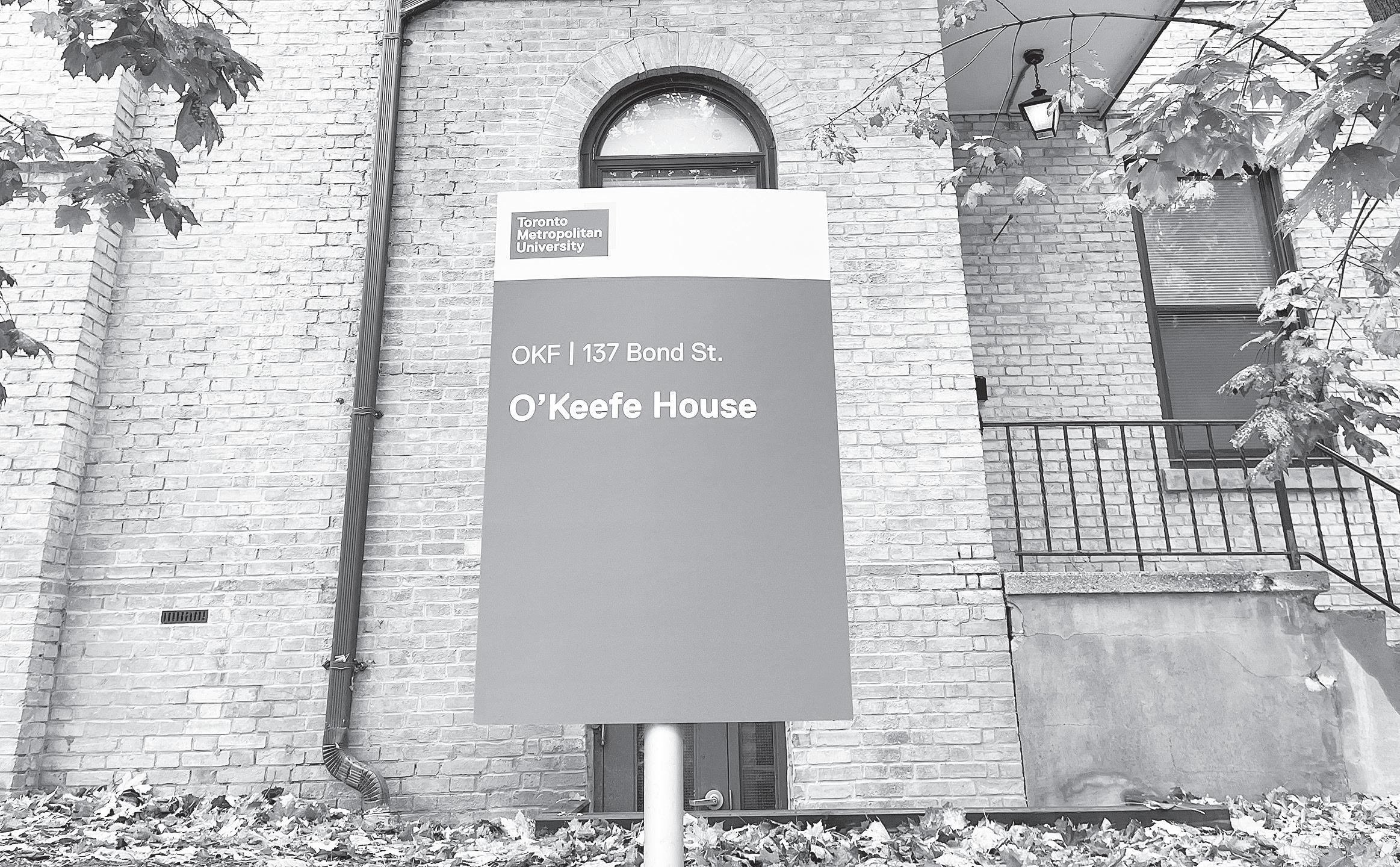
J.D. “Pepper Paste” Mowat
Apurva “Monetary Policy Expert” Bhat
Rochelle “More Money, More Problems” Raveendran
Aditi “Ms. Worldwide” Roy Shaki “#1 Kothu Roti Fan” Sutharsan
Anastasia “Patience is a Virtue” Blosser
Ankit “Team player” Choudhary
Kaitlyn “Winner winner chicken dinner” Stock
Keiran “Still Waiting… Again” Gorsky
Nathan “Right on Time” Gerson Dexter “JBL” LeRuez
Andrew “RAW File” Yang Mikayla “Keefe Defender” Guarasci Mitchell “Big Uber” Fox Matthew “Lens Wrap” Lin Tyler “Baseball Guru” Procyk Armen “Quality Rapport” Zargarian
“If the school is trying to improve students’ mental health...it shouldn’t be on the students”PEYTON KEELER COX/THE EYEOPENER
For second-year computer engineer ing student Behzaad Pathan, Cha chu’s tandoori chicken roll is his goto food order on campus for a bite with friends between or after classes.
Tucked into Bond Street, a side street off Gould between campus coffee shop Balzac’s and staple To ronto Metropolitan University (TMU) brunch spot Oakham Cafe, Chachu’s acts as something of a hole-in-the-wall for students.
In warmer weather, the restau rant barbecues on their patio, allow ing students to catch a whiff of the cozy, seasoned and spiced Pakistani street food that, to some students, feels a little bit like home.
Behzaad said he usually goes with a friend and Chachu’s offers a $25 com bo for two which includes a bowl, two wraps and two sodas, making the restaurant a good option for students to hang out and socialize.
“The taste is pretty good and their customer service is also really
nice,” he added.
Chachu’s, which opened up short ly before the fall 2022 term, is just one of the wide variety of food op tions that students have to choose from, on or near campus. These es
tablishments include competing cof fee shops to restaurants along Yonge Street, like Yonge Street Warehouse or Salad King.
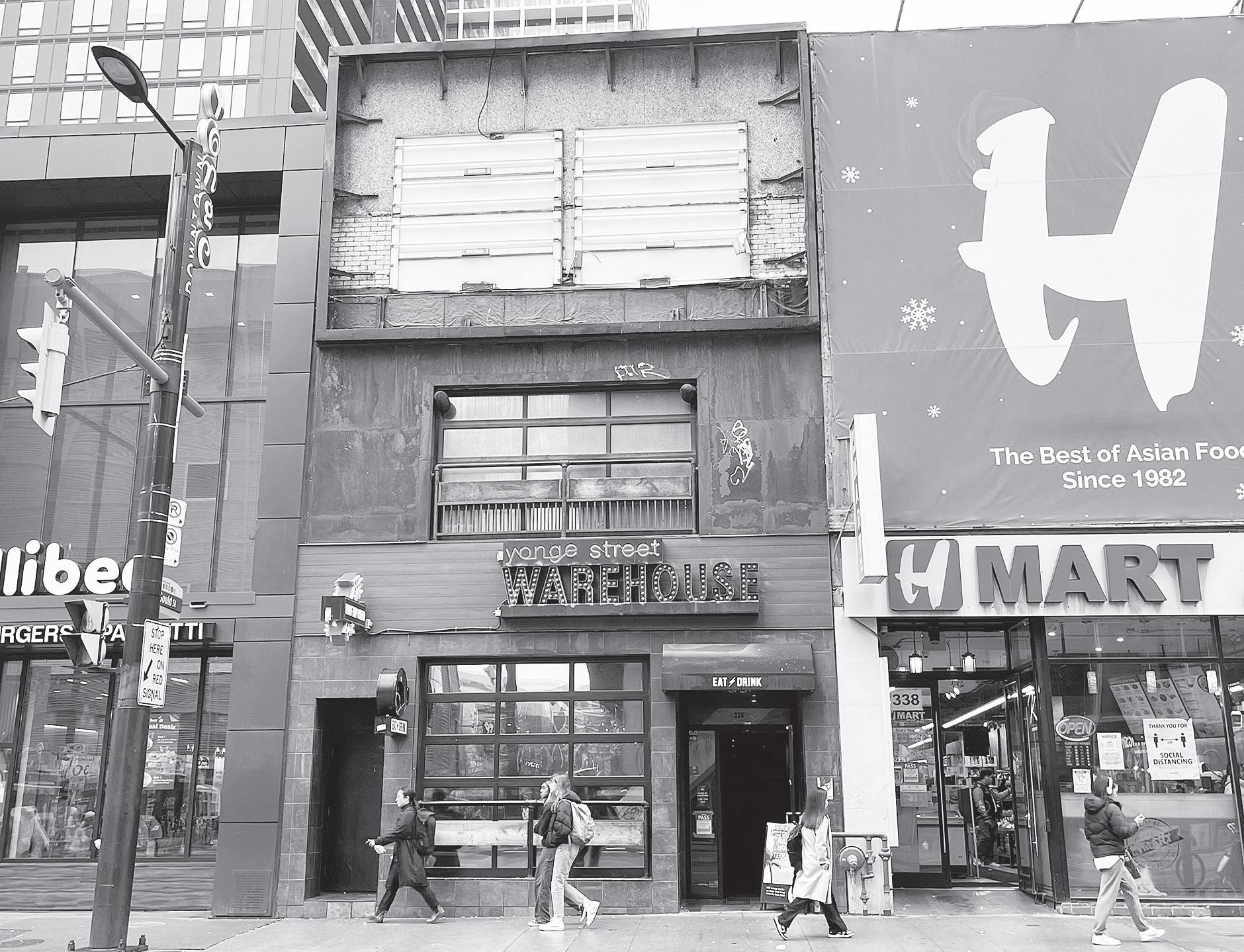
These restaurants compete on a daily basis to satisfy the appetites of
students and keep their lights on— and they use targeted business strat egies to do so.
Matthew Philp, an assistant mar keting professor at TMU’s Ted Rogers School of Management, said restaurant owners should be confident in how they position and differentiate themselves in order to stand out and not only attract, but keep, clientele.
He added that positioning a busi ness can include taking product pricing, combo options, dietary con cerns and student-focused deals into consideration, as well as the quality of their food.
“What I always say in my classes is you can’t target everyone,” said Philp. “You have to pick a lane. By targeting everyone, you target no one.”
medical engineering student at TMU who enjoys a regular cup of coffee at Oakham Cafe.
She said their hours fit well with her school schedule and Oakham’s central location on campus allows for easy access for students coming in and out of classes. “Their prices are also pretty reasonable,” she said.
Say Bagni, an Oakham Cafe barista and second-year photography studies student, said the cafe prides itself on
Salar Hussein, the owner of the Chachu’s location near TMU, said he focused on three factors when opening up in a location near cam pus: affordability, taste and cooking pace. He added that the staff at Cha chu’s is young, which he said makes it easier for students to connect with them.
Hussein also mentioned that he is excited about the increased campus traffic since the transition back to full-time classes post-pandemic.

“Since campus opened back up, I think I am the happiest man alive,” he said. “It is very nice to see the campus full.”
Emma Panacci is a first-year bio
being accessible to students.
“Oakham is significantly cheaper than most of the coffee shops down town and we cater to students and their needs,” Bagni said. “For exam ple, we don’t upcharge on milk al ternatives like other places because it’s super common for people not to consume dairy milk.”
Bagni added that the cafe’s menu options are curated toward stu dents’ tastes and dietary restric tions as well, packing in decent portions per meal.
The Student Loan Special, one of Bagni’s recommendations, is priced at $6.59 and offers the option of scrambled eggs with a tofu alterna tive, with roasted tomato and home fries on white or wheat toast. Pro tein add-ons also include bacon, chicken-bacon or Beyond Meat.
“The special gives you an entire breakfast for less than seven dol lars, and our vegan options are ac commodating for lots of students,” Bagni added.
While budget plays a factor into students’ food decisions, Panacci said another reason she studies at Oakham is because of the ca fe’s comfortable and aesthetically pleasing atmosphere. The newly renovated cafe has natural light, accented exposed brick walls and potted plants scattered throughout the establishment.
“Students will also think about if the restaurant is a place they want to spend time in,” Philp said, adding that when consumers develop an emo tional connection to the space, it gives them reason to come back.
Philp said that ultimately, success is about figuring out the wants and needs of the consumer. Whether it’s a place with nice vibe and good music or a quick, easy snack before heading to class, businesses should embrace their customer demo graphic and own it.
“The good thing for students is that they have many options around campus,” he added. “With each one bringing something dif
“By targeting everyone, you target no one”
“Since campus opened back up, I think I am the happiest man alive”
“The special gives you an entire breakfast for less than seven dollars”
CONTENT WARNING: This article contains mentions of violence and suicide.
Iranian women at Toronto Metropolitan University (TMU) are standing in solidarity with those in Iran as protests continue.
Many Iranian students have been organizing protests at YongeDundas Square over the last several weeks. Among the organizers is third-year engineering student, Hijrah Nasser.* She said the goal has been to gather the support of students and other young people in Toronto.
attend a soccer game in Iran and was arrested. She allegedly died by suicide shortly after.
Women have been required by law to cover their hair, arms and legs in public since the Islamic Revolution in Iran in 1979 but the severity of the enforcement of dress code laws has varied depending on who is in power.
Nima Naghibi, an English professor at TMU and an Iranian scholar, said the morality police are tasked by the president of Iran with enforcing the modesty dress code. While this also affects men, the rules are more strict for women. She explained that the current president, Ebrahim Raisi, imposed tighter restrictions and gave the morality police more power than previous leaders.
since the protests began.
“I’m hopeful and exactly at the [same] time, I’m hopeless as well because so many people are dying,” said Asghar. “They’re killed on the streets.”
“I really wanted to shed light on the fact that these children of the [Iranian] immigrants are also very passionate about what’s going on,” said Nasser.
Both of Nasser’s parents immigrated from Iran, relaying stories about the country’s laws. She said she was familiar with hearing about tragedies like Mahsa Amini’s.
In September, 22-year-old Mahsa Amini died in hospital, days after being detained by Iran’s morality police for allegedly not having her hair adequately covered, according to CBC News. Hossein Rahimi, Tehran’s chief of police, said Amini’s death was an “unfortunate” incident, denying witness accusations that officers had beat her.
Protests have erupted across Iran in the weeks following her death, with women demonstrating against the country’s dress code laws by burning their headscarves and cutting their hair. In Toronto this weekend, a human chain formed from Yonge Street to Steeles Avenue. Similar human chain protests occurred in areas across Canada, including Vancouver, Winnepeg, Calgary, Edmonton, Ottawa and St. John’s.

“Usually you just hear she was pushed around or they took her in a car or they ripped her whole hijab off and started hurting this young woman,” Taebi said. “But this was a more very extreme approach.”
Naghibi, who originally immigrated to Canada from Iran when she was 12, has written about Iranian feminist movements. Naghibi echoed Taebi in saying these protests feel different from ones that have taken place in Iran throughout the 20th century.
“What’s interesting about this particular moment—and the slogan; woman, life, freedom—is that women’s issues are now placed at the forefront of these protests. And they are refusing to take a back seat,” Naghibi said.
“They’re refusing to let their movement get co-opted.”

Naghibi has been published academically for her text, “Rethinking Global Sisterhood: Western Feminism
And Iran,” drawing initial criticisms from how the western world handled Iran’s 1979 political revolution, when the hijab became mandatory.
Muslim feminists from around the world have been vocal in stating that the choice to wear the hijab is deeply personal.
Naghibi also pointed out that the core issue is women’s choice, not religion.
“It’s not an anti-hijab protest,”
Naghibi said.
“What they’re asking for is freedom of choice—the decision to wear the veil or not wear the veil.”
She noted that the protests in Iran have seemingly paused the morality police.
“It shows that the government is becoming a little bit scared,” Naghibi said.
*Names have been changed to protect source’s privacy and security
The Immigration and Refugee Board of Canada said in a 2020 report that the nature of enforcement in Iran varies based on the location and time period of the alleged dress code violation. According to the report, a woman accused of “bad hijab,” or inadequately covering themselves according to the law might be escorted to a police station until a family member comes to provide with clothing that’s considered adequate.
Others might be made to attend classes provided by police. However, there are also accounts of women alleging they were brutalized by police after being accused of violating dress code laws.
Third-year professional communications student Rojhin Taebi, said she was saddened by Amini’s death and was reminded of her cousins living in Tehran, who are the same age as Amini.
But she said she wasn’t shocked by the news. “We hear about this situation every so often,” Taebi said. This kind of arrest is not uncommon in Iran. In 2019, 29-year-old Sahar Khodayari dressed as a man to
Taebi added that recent protests feel different from others that have happened in Iran in the past. The last time protests of a similar calibre occurred was in 2019, when protestors demonstrated against the increasing state-controlled price of gasoline. This time, women are taking the lead.
“This is a very compromising protest in that the women are front and centre,” Taebi said.
Rahmah Asghar,* a representative for the Iranian Students’ Association of TMU, said she has been checking social media and the news frequently to stay informed of events, though she added that it has been difficult to do so with the widespread internet outages in Iran
“This is a very compromising protest”
“We hear about this situation every so often”
“Women’s issues are now placed at the forefront of these protests”
“What they’re asking for is freedom of choice”
CONTENT WARNING: This article contains mentions of transphobia
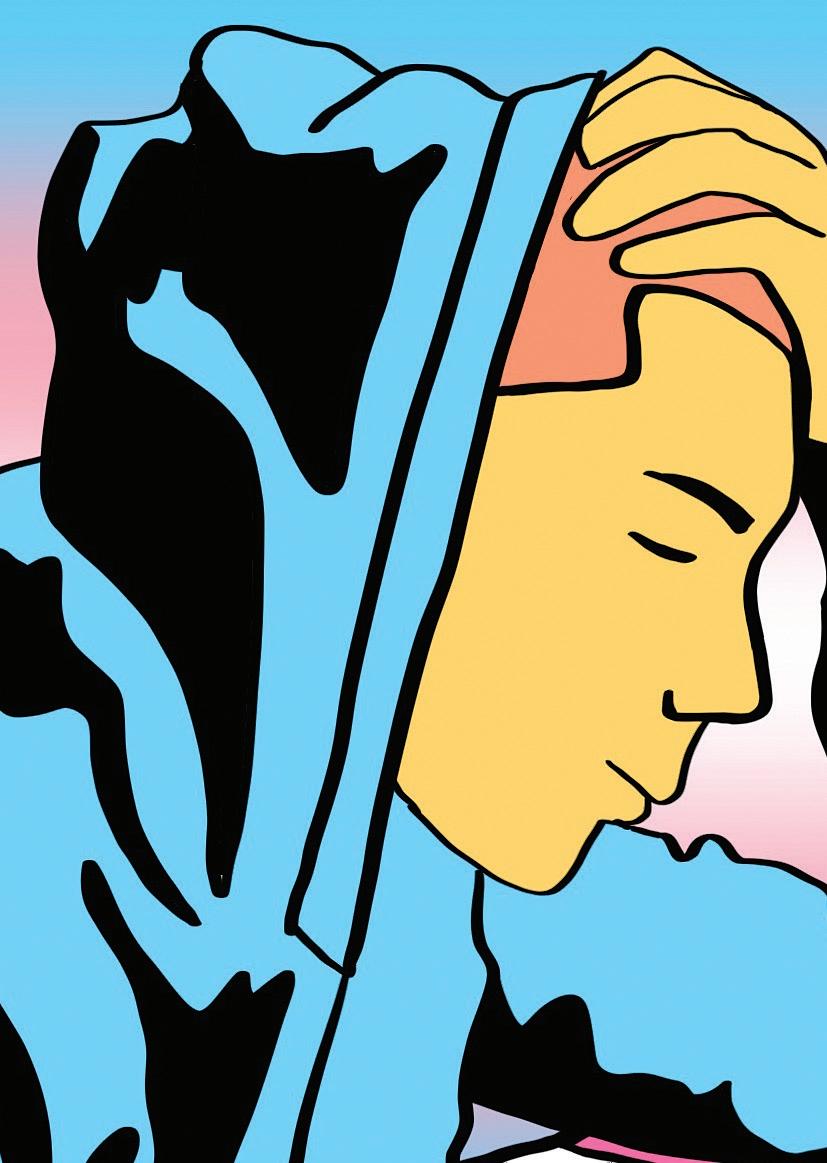
It was a stuffy June morning when Francis May* entered their psychology class for the first and last time. They entered the classroom and slipped into a desk in the back row. May signed up for the course in one of their first couple of years at the school and took it in the summer to ease up their course load during the fall and winter terms when they worked 30 hours a week.
May unpacked their computer and notebook and set up for class as others filed in. At nearly 10 minutes past the hour, the professor sailed through the door. As the teacher set his things down and started up the projector, he stated bluntly, “By the way, I don’t give trigger warnings,” May recalled.
That’s when May thought they were “in for something bad.” They were just beginning to figure out their gender identity and the professor’s jarring entry indicated this class likely wouldn’t be a comfortable learning environment for them. Despite their first impression, May says they reminded themselves to keep an open mind and hear where the professor was coming from—but that sentiment was short-lived. “It was harder and harder to empathize with him as he continued talking.”
The professor went on to explain his feelings on trigger warnings—how he thought being “triggered” meant having an “elevated nervous system.”
May remembered students looking around the room, confused and shocked. A few who disagreed raised their hand to refute, but were quickly shot down by the professor, who said they were misunderstanding him.
The Eyeopener reached out to the professor, who said while he doesn’t call them “trigger warnings,” he lets students know beforehand that they will be discussing controversial and hard topics in his class.
After a few rounds of student objections, the class gave up trying to change the professor’s mind, May said.
Given the course touched on gender and sexuality, his views bubbled to the surface in short order. He explained how he agreed with Jordan Peterson’s remarks—that being asked to use a person’s personal pronouns as opposed to their “real” ones is a violation of his rights. In the interview with The Eye, the professor stated that Peterson initially presented the issue poorly. But, he agrees with his sentiment that “we shouldn’t have compelled speech.” He said people shouldn’t be compelled by law to use certain pronouns, even though he chooses to respect people’s pronouns himself.
By this point, May’s blood was boiling. They’d been panickedly texting their partner throughout the class as they began to feel distressed by the content. Despite feeling angry and upset, May says they knew they weren’t in immediate danger as they didn’t think the professor could tell they were trans.
“I’m safe in the moment,” they remember thinking. “Because to him right now, I just look like a cis woman. So I’m just going to sit through this and then I need to leave.”
May used the next 45 minutes of class to look online for other courses to switch into. When they couldn’t find one, they tried to work out the mental math of how they’d fit the class into their fall or winter term, while continuing to work 30 hours weekly.
Finally, an hour and a half in when the professor called for a break, May scooped up their belongings and loudly told the person next to them that they were only leaving to get a drink of water. They suspected the professor might call them out if he knew they were trying to leave the class.
May isn’t sure if other students left too—they didn’t turn around to look behind them for fear the professor would see them leaving. They kept their eyes glued to the double doors that lead them out of the classroom. Only once they were in the stairwell and the classroom was out of sight did they take a moment to break down. Their heart rate still high, May sat on the empty yellow steps, focused on steadying their breath despite the panic in their chest.
At the hands of their teachers, trans students at TMU say they endure transphobia in many forms—the kind that’s hateful and the
kind that’s born out of ignorance. And depending on the severity of the transphobia encountered, students face a range of aftereffects. Some feel extreme embarrassment while others, like May, feel they have no choice but to drop a class.
And while there are options for students to report these incidents, trans students say they barely use them. Despite the hurt, anger and humiliation that comes with transphobia, students are hesitant to report it for fear that the process might cause more harm than good. “The [reporting processes] offered are not always safe for students to pursue when they’ve already been harmed by someone in a position of power,” says May.
The university said it has multiple paths to remedy human rights issues like transphobia. They can go directly to their course union or department, they can seek advice and help from the ombudsperson, or they can go to Human Rights Services (HRS), which can pursue discussion-oriented or formal investigation processes.
“At TMU, we are committed to equity, diversity and inclusion,” said president Mohamed Lachemi. He said the Centre for Excellence in Learning and Teaching offers a diversity of programs for faculty that focus on equity, including workshops about trans and non-binary student inclusion in the classroom.
The Trans Collective, one of six equity service centres at the Toronto Metropolitan Students’ Union (TMSU), can also provide support to students through any of these processes, too.
However, Ollie Coombs, the former director of the Trans Collective, says from July 2021 to October 2022—the year he worked there—only five students came to him with complaints about transphobia in the classroom.
After the disastrous first class, May made their way to the deserted course administrators office. Despite their sympathy for May’s situation, they couldn’t switch them into any other courses that term or issue a full refund. The administrator only advised May of the school’s Student Care office, which isn’t a primary office that hears complaints about professor conduct. Fearing retaliation and knowing nothing about the process, May had no interest in that option. With a feeling of hopelessness, they dropped the course.
From 2016 to 2018, the school’s HRS office pursued 240 human rights complaints, according to a report released by the department. Only six of these cases were related to gender identity. According to the school, they’re preparing to release 2021-22 complaint numbers shortly, but say this data shows reporting of “very few cases involving transphobia.”
Many trans students say they simply aren’t aware of the options available to remedy their transphobic experience. Despite promotional materials on billboards around campus that advertise the ombuds office, the Trans Collective’s posting on social media or HRS’ online Human Rights 101 module available to all students, trans students say they haven’t been made aware of where to turn in the face of transphobia at school. Others say they’re simply doubtful that the process would help them—as they’d have to retell their story, confront the professor, or in a worst case scenario, face retaliation from an educator.
Brea Hutchinson, a trans and feminist advocate and the director of operations at the Women’s Legal Education and Action Fund, says the onus to report—and transphobia in university classrooms generally—add another layer of difficulty to higher education.
“Not only do we have to go through everything else, all the hardships (of university), we also have to succeed in a space that’s been violent toward us,” she says.
Coombs, who is also a fourth-year film student, takes the time to email his professors at the start of each term to make sure they’re aware of his pronouns. But too often, that email gets lost in the fold or otherwise forgotten. He gets misgendered a lot and professors don’t always take corrections with grace.
One time in his second year, Coombs remembers a professor misgendering him at the beginning of class while going over the day’s agenda. Coombs’ friend, a usually quiet girl, kindly reminded the professor which pronouns he used. Rather than being apologetic, the professor became defensive, saying pronouns are difficult for him as English wasn’t his first language. He urged the class to be understanding of him, all without correcting himself or apologizing.
At that moment, 25 heads turned to focus on Coombs and his friend in the second row. He could feel their eyes burning on the back of his already-hot neck, wishing in that moment he could just fade away.
The room was palpable with a “silent kind of ‘Ah fuck this is so awkward,’” says Coombs. He sat through the rest of the class feeling terrible.
Coombs finds himself in a class with that same professor this term—only this time around, he doesn’t raise his hand to speak. “We’ve already been through the gamut. So I would rather just not participate with that professor than relive that experience,” he says.
There are overt forms of discrimination at TMU, Coombs adds, as well as small reminders that some profs just don’t understand the needs of trans people—like this instance of misgendering. And though the latter seems less severe, it’s still a boundary to education for trans students, he says.
Mary Breunig is a professor at California State University, Sacramento, with expertise in experiential learning and social justice in education. Breunig does what she calls a “hand slap” activity with her students. They pair up and one person has to answer simple math questions with their hands out in the air in front of them. If they don’t answer fast enough, their partner is allowed to slap their hands.
Most students seize up at the fear of getting slapped, making them freeze and not answer the questions quick enough. This, says Breunig, is likely similar to what the trans student experi-

ence is like in the classroom. “It’s counterproductive to learning if you’re expending that much energy just in the emotional labour of being seen for who you are,” she says.
Coombs says the reason few people complain about transphobia is twofold—in part, trans students have developed their own ways of coping with transphobia because it comes up so often in their lives. Others expect there’s little the school can do to bring
on their own, they can advise the student of where to go. If students want to further their complaint, Coombs advises them to first talk to the department head or their course union, the ombudsperson or HRS. He added that each instance is tailored to the individual experience and what they want out of it. If talking to their department head isn’t something they want to do out of fear, then the Trans Collective can reach out and make that connection.
The approach with departments or course unions isn’t formal, but it is a way to discuss problems with higher-ups in the hope that they will be able to make change.
The Office of the Ombudsperson is an independent body from the school that also hears the student’s concern and then helps facilitate conversations with course unions and department heads. The ombuds office mostly hears complaints about academic issues, according to ombudsperson Maureen Helt. However, the office has heard only a handful of complaints pertaining to transphobia in the past year. Her office refers students to Human Rights Services in cases where the university’s Discrimination and Harassment Policy (DHP) has been violated.
Helt, acknowledges that students haven’t always had the best experiences with these reporting processes. “There is a hesitation to actually take any type of action because in the past, historically, they have found that when they do speak up, nothing happens,” says Helt.
who to contact to make their complaint or express their concern. When students come to her, she makes them aware of the potential length and stress that progressing it might have on them. “A student has to decide for themselves what they want to do. And I wouldn’t push for them to do it (or) discourage them from going through the process,” says Helt.
When Teal’s alarm went off at 5 a.m. the morning of her exam with that same professor, she climbed out of bed—the world still pitch dark outside—and pulled on a pair of jeans and a hoodie.
As she applied a thin layer of foundation, eyeshadow and mascara, Teal tried to think about the content she’d be tested on in just a few hours. But the thought of having to see her professor in-person for the first time popped intrusively into the forefront of her thoughts.
What if I don’t pass in front of him? Will he say transphobic things to my face?
The course had been delivered almost entirely online thus far, given the 2022 winter term was made virtual due to rising COVID-19 cases. Entering the George Vari Engineering Building for her exam after finding the professor’s Twitter, Teal cast her gaze on the ground to avoid making eye contact with anyone. She focused on some breathing exercises that her therapist had armed her with, but it was useless—she was overwhelmed with the stress of the exam, which was worth more than 50 per cent of the final grade and the potential of seeing her professor.
Upon entering the exam room, Teal didn’t have any time to see where her professor was. The teaching assistants seemed to not know what was happening and the man helping with IT was yelling to get people’s attention.
One evening, Sophie Teal* got a message from her friend in her computer science program, alerting their Discord chat to an alarming discovery.
“So uh has anyone seen the prof’s Twitter?,” messaged the friend, along with two screenshots of transphobic tweets that had been retweeted by their teacher. One was supportive of transphobic comments by J.K. Rowling, the author of the Harry Potter series who’s legacy would later come to be clouded by her transphobia and another was a news article in which a group of doctors in the U.S. objected to performing gender transition procedures.
Only when the assistant professor told the class the first professor wasn’t in the building two hours into the exam, did she realize he didn’t show up. Teal let out a sigh of relief.
In hindsight, she says she’s discouraged at the school’s lack of action when it comes to dealing with transphobic professors. “I trusted this university when they said they cared about people like me.”
change, so they choose not to amplify and re-live their pain by reporting it.
According to 2019 data from the Government of Canada on the experiences of post-secondary students with gender, gender identity or sexual orientation-based discrimination, Coombs is right.
The report stated that very few students—seven per cent of women and five per cent of men—reached out for help from their school when dealing with gender and sexuality-related discrimination. The report included trans students, though gendered their results.



Sixty-five per cent of the respondents said they didn’t report the incident because they didn’t think it was serious enough. Of those who did complain, 11 per cent said they didn’t think the school would take it seriously and 10 per cent of respondents felt embarrassed or ashamed of the incident.
Despite the low reporting numbers, Coombs did what he could for those who came into his office after experiencing transphobia. Students are greeted more often than not by an open door to the Collective’s office on the second floor of the Student Campus Centre (SCC). The small room boasts two sleek, simple couches, an armchair and a desk in the far corner of the room. Promotional materials from past events hang from multi-coloured push pins on the two big bulletin boards in the room. Bins of buttons and stacks of educational pamphlets on trans healthcare, among other subjects, lay in wait for curious students to pick up. It’s a smallbut-quaint and quiet space that Trans Collective members like Coombs have tried to make feel safe.
While the Trans Collective can’t carry out resolution processes
The Eye reached out to this professor. He responded saying that these are his personal, private views and that he is not transphobic. He said, however, he is concerned with the erosion of womenonly spaces and the sex reassignment industry exploiting children.
Teal’s chest swelled with a sinking feeling—one she gets when she hears something transphobic. She did some digging of her own and found more and more controversial content on the Twitter page. She felt sadness—how could he get away with this, especially since his Twitter was so publicly available?
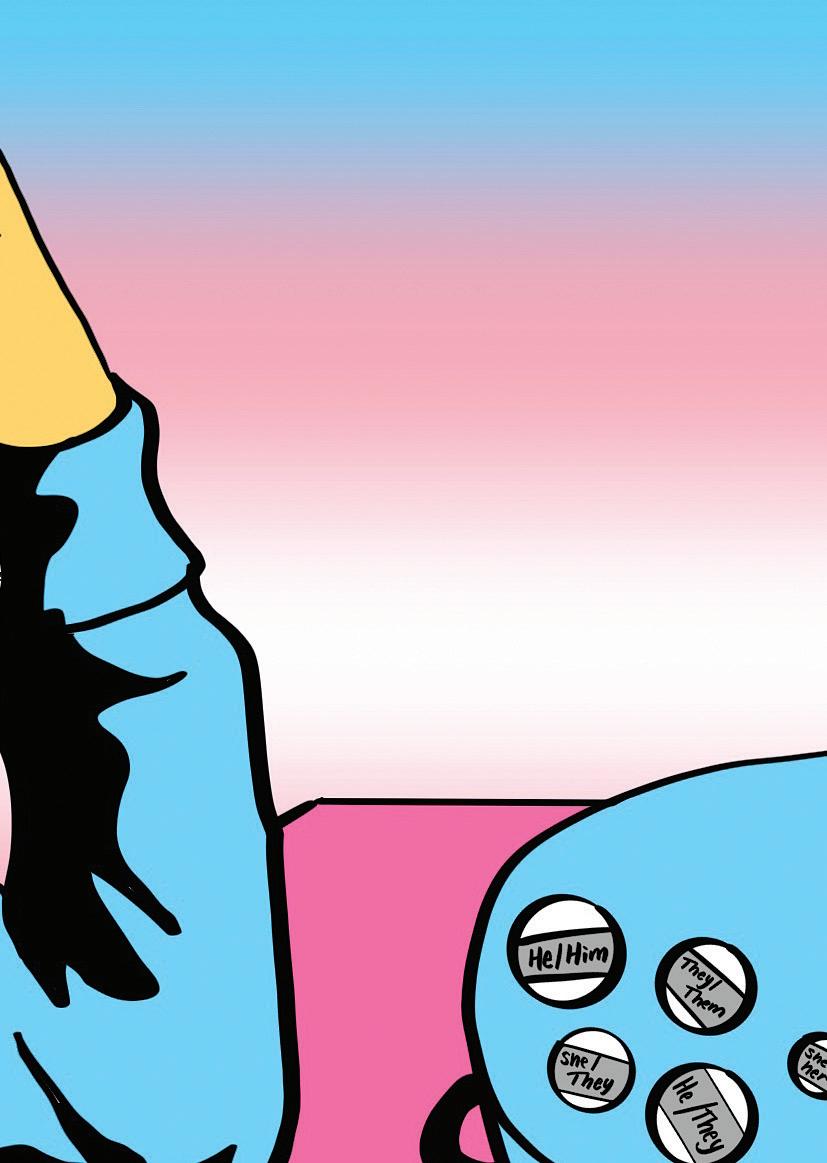
After finding the tweets, Teal had messaged her year’s representative from the Computer Science Course Union (CSCU) on Discord about the professor. She passed along the screenshots of the transphobic retweets and the representative promised to bring up the issue to the CSCU. Teal then found out the issue with that professor had been made known to the course union a few years prior.
Teal says the representative tried hard to help her but “just couldn’t get very far.”
And on top of not knowing about the ombuds office’s or HRS’ complaint processes, Teal didn’t care to try and revive the issue. “I don’t feel like trying anymore, to be honest,” she says. “I have too many problems in my own life to deal with this one too.”
Hutchinson says putting the burden on trans students to report through an arduous procedure isn’t fair. Those with power, like faculty and university bodies themselves, should wear the burden of making classrooms safe, not trans students, she adds.
“Students, who have the least amount of institutional and interpersonal power in the university, are the ones who are most responsible to create a more just classroom. It’s completely backwards.”
Helt says she’s aware some students see the ombuds’ reporting process as something of a burden when students are not aware of
In a statement to The Eye, the university said, “Toronto Metropolitan University (TMU) is committed to fostering a collegial study and work climate that is free of discrimination and harassment and one in which all individuals are treated with respect and dignity.” They further added that “the university has policies and processes in place, including the DHP Policy, to address and prevent concerns relating to discrimination and further its commitment to fostering a welcoming, supportive, and respectful learning, teaching, research, and work environment for all.”
May returned to the same course in the regular school year, this time taught by a different professor. This second professor made the course accessible and comfortable, says May. Their required readings alone touched on sex and disability, perceptions of trans identities, affirmations of trans identities during sex and more—none of which they say were on the syllabus in the first class.
May says they don’t think any space is ever 100 per cent safe, but says centres by and for queer students, like the TMSU’s equity centres and classrooms with queer professors, are some of the safest on campus. They add that the recent change in allowing students to use their preferred name in the school’s systems is very positive, but more still needs to be done in order to protect trans students at TMU.
Revising the Discrimination and Harassment Policy to more difinitively say anti-trans sentiment is a violation of those students’ rights on campus would also be a positive change, according to May.
Coombs, too, would like to see policies revised, as well as a dedicated gender and sexuality office on campus. Seeing as the University of Toronto already has such an office, he hopes TMU might follow in their footsteps. Coombs says this would take some weight off of the Trans Collective’s shoulders, which in the absence of such an administrative office, has stepped in to support all trans TMU community members. The Collective provides support on issues and policy decisions, rather than just simply building community among trans students.
“It’s great that the Trans Collective exists, but it is not enough. [We can’t] just rely on this one office, in a little tiny room in the SCC, to handle everything perfectly.”
*The names have been changed to protect source’s safety and privacy.
“We have tosucceed in aspace that’sbeentowardviolent us”
As I sat near my cousin who was grading the exam papers of the class she was a teacher’s assistant in, she nudged me over on the couch and put her computer into my lap. “You have to see this,” she told me excited ly, opening up YouTube in another tab. “These guys are hilarious.” I watched as she clicked on a video titled “THE GREAT KOTHUROTI DILEMMA.” I braced myself for the five cringey minutes of some one wearing a cheap wig, putting on an exaggerated accent and acting the part of their ‘Stoic Brown Dad’ whose slapstick comments serve as the punch line of the unfunny jokes.
Instead, I spent the next three min utes watching a hilariously scripted sketch featuring a Tamil dad, his son and a case of missing kothu roti. For those unfamiliar with kothu roti, it’s a glorious dish that’s a staple in the Tamil community, made with chopped up roti, stir-fried with spices, curry, herbs and meat or veggies.
The dad spoke entirely in Tamil while his son spoke in English—a common characteristic in many im migrant households. In fact, that’s how I’ve communicated with my parents for most of my life—in a smooth mixture of English and Tamil that several multilingual fam ilies may be familiar with.
Immediately after I watched the video, I took my cousin’s laptop over to my dad. “You need to see this,” I told him, repeating my cousin’s words from earlier. My mom then came over to see what we were laughing at and I played the video for them again. She giggled when the
“dad” realized his kid ate not only his beloved kothu roti but also his Necto, the Tamil equivalent of—which is possibly better than—Diet Coke.
Basement Reels, the channel behind “THE GREAT KOTHU ROTI DILEMMA” has made over a hundred videos since launching in 2015. The channel was founded by Tharshan Rajendiram and Krusan Sivanayagam and has amassed over 80,000 subscribers.
Rajendiram says with a laugh. He viv idly remembers sitting in the back of his Grade 3 classroom with his ESL teacher, learning the alphabet while the other kids were listening to their usual lesson at the front of the room.
It wasn’t until his middle school drama class that Rajendiram discov ered that there was a way he could connect with his peers—by making them laugh. “Finally, there was that bond we created—the audience and me—and I finally felt like I fit some where in this society...in this puzzle.”
When I was younger, I found my self desperately grasping onto hu mour that relied on people making fun of their brown parents. It was the only thing I felt I could relate to, even if it was in some small, needy kind of way.
But now, together with my family, we’ve steadily made our way through most of the Basement Reels sketches over the years. Some tackle topics like premarital sex, being a part of the 2SLGBTQ+ community and mental illness—topics that I’d never seen ad dressed in a Tamil perspective before. Not only do these comedic videos bring light to important issues in a di gestible way but they also help people to connect in many ways.
Rajendiram says he started the channel in 2015, when he gradu ated from the public administration program at Toronto Metropolitan University (TMU). He immigrated to Canada when he was eight years old, fleeing genocide and war in Sri Lanka. “When I came here, I struggled to fit in. I didn’t know the language. I was learning the ABCs in grade three,”
Comedy has become a way for Ra jendiram to connect with his commu nity. To him, this connection is most evident when Tamil kids and parents tell him that the same thing from a Basement Reels sketch has happened to them or that Rajendiram’s comedy sketches have helped them connect with their families through laughter.
The kind of connection that com edy brings can be as simple as watch ing funny movies with your family, or as large as a comedian performing to hundreds of people at a festival. Comedy is all around us and is acces sible through various outlets.
PEYTON KEELER-COX/THE EYEOPENERwhy comedy brings so many people from different walks of life together is because it’s unrestrictive. “Comedy has no boundaries,” he says.
Lau has used comedy as a con nective tool all his life. He sends his family TikToks that he finds par ticularly funny. He finds common ground with his Chinese immigrant grandparents by watching tradi tional puppet shows and immers ing himself in the comedy that they would’ve been familiar with when they were younger.
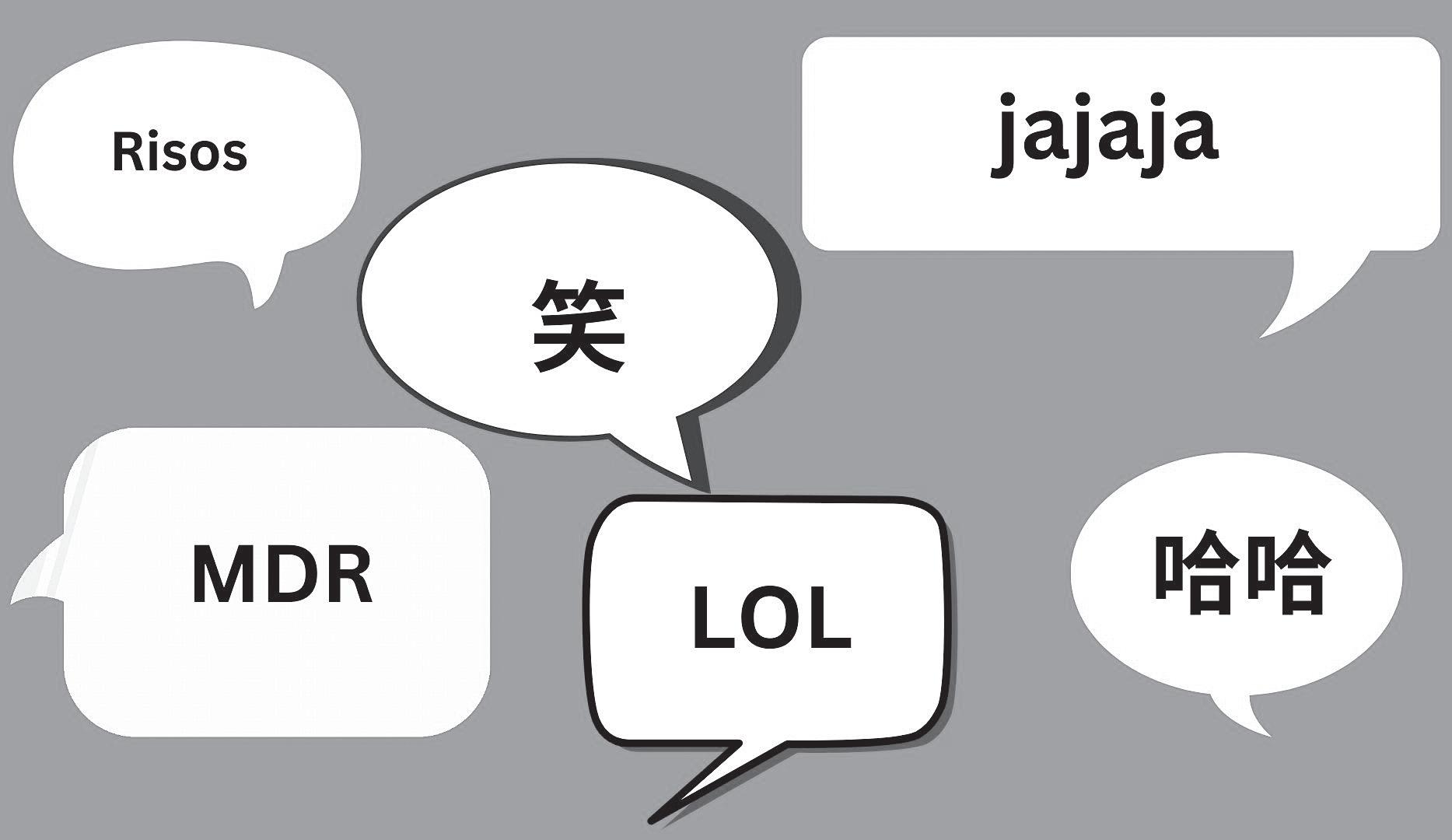
sation club and started organizing meet-ups last fall. The club is now called, “Yes, And?” and recently be gan hosting weekly drop-in sessions on Wednesday evenings at Kerr Hall. Before Lau, TMU’s improv club fizzled out of action when the pandemic started and most of its founding members graduated.
One of Erwin Lau’s earliest and most favourite memories is watching comedy movies with his dad. Lau, a third-year performance production student at TMU, recalls those mo ments with a fond laugh, saying he still loves to think about the time he would spend laughing alongside his dad. Lau thinks one of the reasons
Growing up in Hong Kong, Lau says school was pretty competitionheavy and intense. To relax, he took up improv in his free time through his school’s drama club. After mov ing to Canada in 2018, Lau says he didn’t understand a lot of the cul tural references here and struggled to connect with people. But like Rajendiram, he quickly found that comedy is a powerful tool in bridg ing cultural gaps.
“I used comedy and improv to connect with [people] because it’s all based on what you make up,” Lau says.
Lau revamped TMU’s improvi
During the height of the pandemic when our interactions were limited to glitchy video calls and driveway meet-ups, my best friend and I com municated exclusively by exchang ing memes. When I was anxiously waiting to be called into my doctor’s office to get my blood drawn, a noti fication from my family’s WhatsApp group chat of a silly TikTok my dad sent made my breath come a little easier. Laughter has been a vital part of all of my relationships and I have no doubt that it will continue to be.
So….improv club anyone?

rounding the 2020 American presi dential election.
Andrea Bougiouklis hadn’t planned on becoming a published writer, but on Feb. 8, her novel The Art of Becom ing a Traitor was released worldwide.
Bougiouklis, a creative industries student at Toronto Metropolitan University (TMU), said The Art of Becoming a Traitor was her first sub stantial writing project.
Bougiouklis said she found inspi ration in the cyclical nature of human history. She started writing while witnessing the political culture sur
The novel follows Eleri, a young woman who discovers she has been used as a political pawn for a corrupt government. Working with her best friend Fyodor, the pair must overturn a war in a dystopian society that threat ens to execute an entire population.
Bougiouklis noticed that current political affairs resembled what she was studying in history class. She drew from real world examples of corruption and societal downfall to flesh out her futuristic setting.
“Looking back, I feel like a lot of the themes still remain consistent with different world events,” she said.
Rather than planning a plot, she wrote the story backwards—begin ning with the final scene and draft ing around it. Whether it’s working around a clever piece of dialogue or an idea for a scene, Bougiouklis said her artistic process varies from one project to the next, so her creativity stays fluid.
“There’s no timetable for how this is supposed to work, just keep writ ing. I know it’s terrible,” Bougiouk lis said, laughing. “It’s probably the worst advice, but honestly, just write. If you believe in your story, someone else is going to as well.”
Before the novel was published, it was a Microsoft Word docu ment written in three weeks. The first person to read an early draft was Bougiouklis’ high school friend, Chloe Elek.
After reading it in two days, Elek encouraged Bougiouklis to reach out to agents and get the novel published.
“I was so sure that someone would
want it,” Elek said. “Even if they didn’t, she would get it done herself because she’s so hard working and determined. I have always known that she would accomplish anything she wants to.”
Bougiouklis ultimately signed a contract with 5310 Publishing, which edited her manuscript and kept her involved creatively. By choosing a smaller company, Bougiouklis had a say in design choices like the cover and text formatting.
“It’s not about finding a publisher who’s just going to put your work out there,” she explained. “It’s about finding one that fits you.”
Before coming to TMU, Bougiouk lis was a devoted soccer player and wanted to play in the U.S. until an in jury stifled her aspirations. Suddenly, she was in her late teens and faced with the growing pressure to change her life’s plan. She then realized her love for writing—which she had been doing her whole life—could be chan nelled into a career.
“There was never a time where I wasn’t writing some type of story,”
she said. “This is what I’ve always been doing. I might as well just keep making that happen.”
Bougiouklis said writing came easily to her and she was often ex posed to it growing up. It became her go-to hobby whenever she was bored. Rather than doodling in mar gins, she would write little scenes during classes.
After landing a season-long in ternship with the Vancouver Ca nucks, Bougiouklis moved to the West Coast in August and deferred her fourth year of studies. She said working in media production for the team combines her interests. “Sports and media—like films or books— have always been the two biggest things in my life. It would feel right if I was doing something that merged both of them as a career.”
Though she could count on friends to buy the book, she said others have been “overwhelmingly kind” online. “The most rewarding part is seeing people enjoying it and connecting with the story in different ways. I want to resonate with people.”
“Comedy has no boundaries”
somewhere in this society...inCOURTESY OF ANDREA BOUGIOUKLIS
The Toronto Metropolitan Univer sity (TMU) Bold men’s basketball team has clear aspirations for the 2022-23 season—to win big.
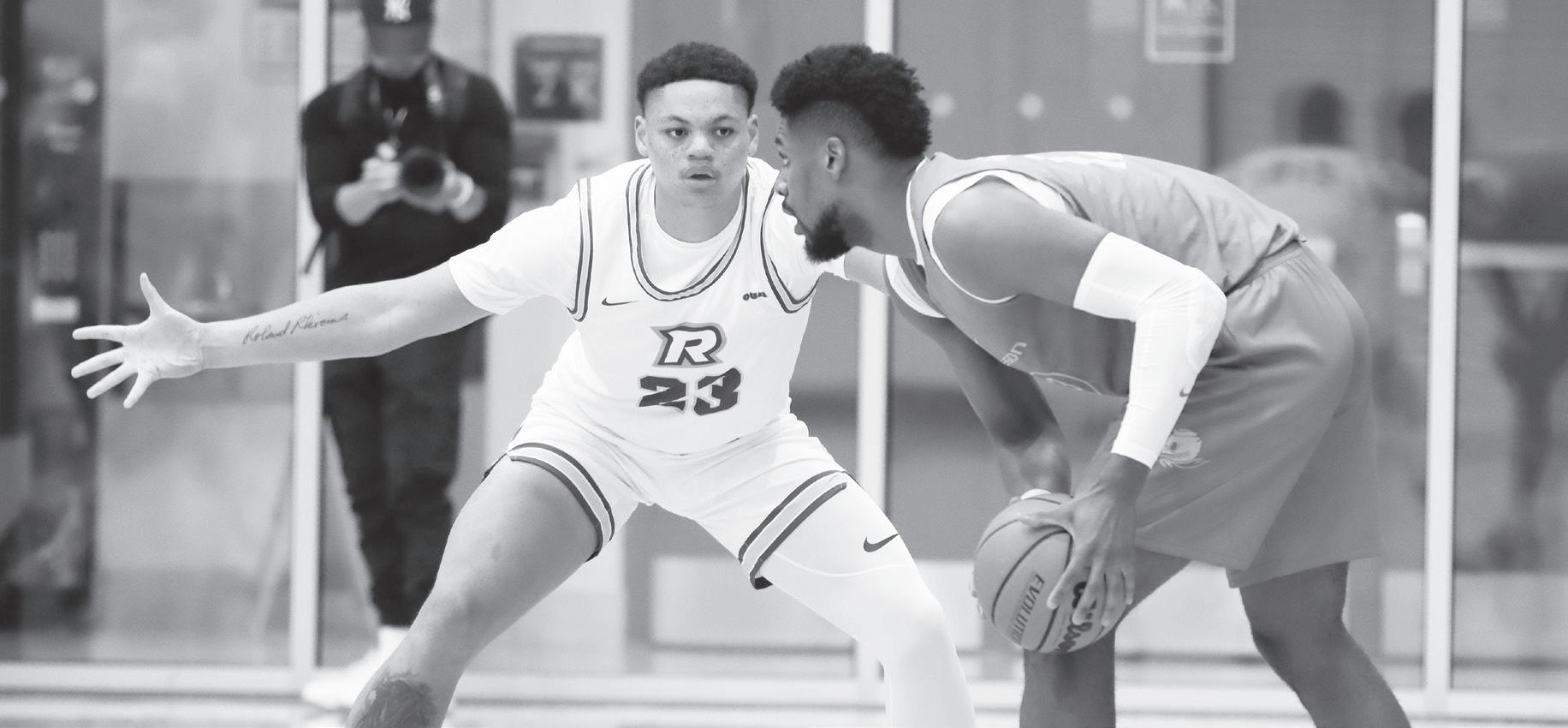
The Bold had a 9-7 record last season, eventually losing to the Car leton Ravens in the Ontario Univer sity Athletics (OUA) playoffs. Their focus returning from the pandemic was to start building a team identity, one that never fully formed.
“Last year was an odd year in a lot of ways,” said head coach David DeAveiro. “Coming back from not playing for a year, not being able to re cruit, get out there and build relation ships because of COVID-[19] still.”
“We kind of put a team together last year and hoped we could make it work,” he added.
this year's group has been training together since July. Last year’s team didn’t practice together in full until the Labour Day long weekend.
“No hate to my guys last year, but with this year’s group, there’s more intention, more hunger to be in the gym and work,” said team captain Aaron Rhooms.
the potential of this squad, it just re assured me that it’s possible.”
Rhooms worked on improving his basketball IQ this offseason to manage the defences that will be scheming to stop him. But his as surance about the team's potential stems from the early camaraderie.
starting rotation.
Chamberlain spent last season on the Bold’s bench as a redshirt. He and Choudhary spent early sum mer at TMU’s campus gymnasi ums, working on their ball handling skills, shooting and conditioning.
a role player throughout his col legiate career following the Oct. 1 pre-season game. But at TMU he’ll be a featured part of the team’s of fensive attack.
“David is dynamic in terms of his one on one scoring,” said DeAveiro. “He might be one of the most elite in the country.”
Walker attributes his explosive style of play to growing up playing in Toronto’s northwestern community of Jane Street and Falstaff Avenue.
DeAveiro and his staff took over at TMU in the spring of 2020, mak ing this season their first with a full training camp, pre-season and 22game regular season OUA schedule.
“We’re in a tough conference, tough division,” said DeAveiro. “But that’s going to prepare you for what it’s going to be like at the na tional championships.”
TMU has eight returnees from last year’s team and the majority of
Rhooms averaged 19.3 points and eight rebounds per game in his debut season at the university. This helped him earn U Sports Rookie of the Year.
He also spent the summer playing professionally for the Canadian Elite Basketball League’s Scarborough Shooting Stars. Rhooms teamed up with TMU alum JV Mukama and Grammy-winning rapper J. Cole.
“First thing I told my teammates this year was that we’re winning a championship,” said Rhooms. “Play ing these pre-season games, seeing
"On defence we're able to move as a unit, I think that's something re ally special," said Rhooms.
Third-year guard Ankit Choud hary has his sights set on being the best point guard in the country and said the path there is through team success. Choudhary averaged 13.7 points, 3.1 assists and shot over 40 per cent from the three-point line last season.
TMU’s familiar duo of Choud hary and Rhooms will be compli mented by guard David Walker and forward Simon Chamberlain in the
Walker’s arrival for his debut sea son was right on time for TMU. The guard scored 25 points on 68 per cent shooting in his first pre-season game with the squad on Oct.1.
He spent last season at California State Bakersfield of the National College Athletic Association, a Div. 1 school—the highest level of college basketball in the world.
“I called TMU because they have a history of winning,” said Walker.
“And I know Coach Dave is a great coach. I got to take the best coach, the best team.”
DeAveiro said Walker has been
“It's just how we hoop,” said Walk er. “That’s how I’ve always been.”
DeAveiro sees the Bold posing a lot of problems for opposing defenc es this season, with dynamic scoring abilities throughout the rotation.
“Who are you going to stop?” he said. “Our bench is good in their supportive roles too and under standing what they're good at will help us be successful.”
The season begins on Nov. 5 at the Mattamy Athletic Centre against the University of Toronto Varsity Blues. Tip-off is set for 8 p.m.
Armed with offensive weapons and a good mix of veteran and rookie players, TMU will look to use chem istry to their advantage this season.
“No drama, just straight business, '' said Rhooms.
By Tyler ProcykThe Toronto Metropolitan Univer sity (TMU) baseball team finished one of its most memorable Ontario University Athletics (OUA) seasons in team history. It included a perfect game and a nine-game win streak to end the season, but it ended with sights set on next year.
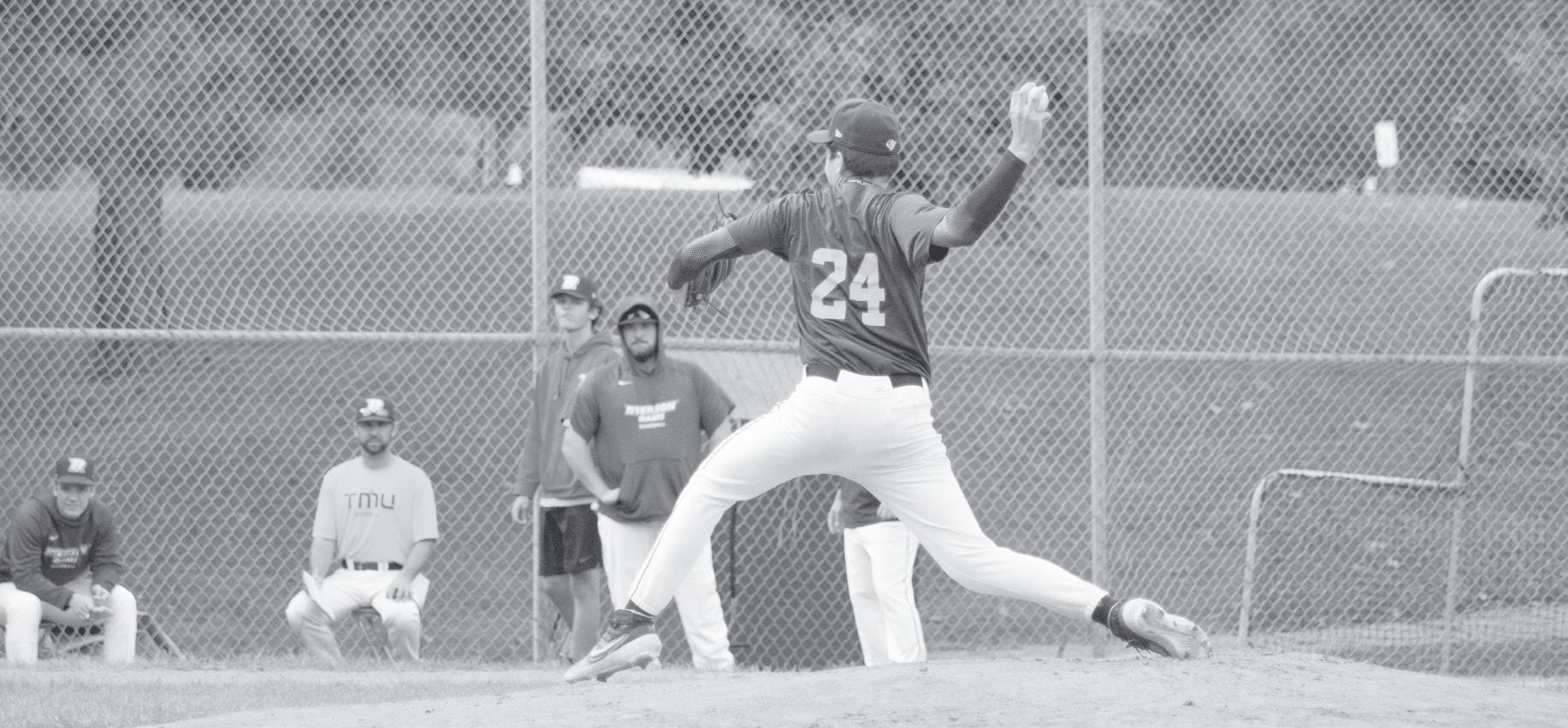
At the heart of the win streak was pitcher Matt Tohana’s perfect game, the first thrown in program history. Tohana’s perfect game, fea turing ten strikeouts, came against the York Lions on Sept. 24 that ended up being the third win in a row for the Bold at the time. “Even when we got off to that slow start, I knew in the back of my head that this team was something special,” said Tohana.
versity of Toronto (U of T) in the regional playoffs. The 11-1 loss that ended TMU’s season on Oct. 9 has players like infielder Thomas Markus ready to come into next year with extra motivation to final ly get over the hump, into the OUA Final Four and take the Central Di vision away from U of T.
“There’s no excuse, we’ve fallen to U of T twice in regional finals,” said Markus. “For next year, it’s Fi nal Four or bust.”
Second-year Alex Guest said the team needs to improve on rising to the occasion and playing better un der pressure. Guest hopes to take on a leadership role in the team's pursuit of an OUA Final Four ap pearance next year.
Looking back on this season, as sistant coach Kevin MacDonald is proud of what the team achieved, but knows they’re capable of more.
MacDonald lit up over his pitch ers’ ability to consistently throw strikes during that stretch run.
“That’s what was our key, everyone clicked at the right time.”
ways been U of T that’s probably our number one drive of motivation,” said Markus. “Beating those guys and showing people it’s not just U of T’s regional division.”
Another season sent home early by the rival down street has the team motivated for next year.
“It’s definitely personal. We want to be better than them and it’s al
The squad is losing veterans as they move on from TMU, mean ing there will be spots to fill on the team next year. MacDonald said the squad looks for players who can help them in any facet of the game.
“Ultimately, we’re looking for guys who are going to push our returning
players and force us to either make room on the roster for them or take an even bigger roster because we can’t turn them away,” said MacDonald.
Tohana hopes to return in the fu ture in some sort of coaching role as the baseball program continues to grow at TMU.
“The team has tons of talent. Talent isn’t the problem,” said To hana. “This year of experience will definitely benefit the whole team for next year and years to come.”
The team now has back-to-back losses against cross-town rival Uni
“When you have a run like that and everything’s working for ev ery individual player, any team can get dangerous,” said MacDonald.
“There’s more intention, more hunger to be in the gym and work”
“Seeing the potential of this squad, it just reassured me that it’s possible”ANDREW YANG/THE EYEOPENER
“We’re looking for guys who are going to push our returning players”
“The team has tons of talent. Talent isn’t the problem”
Though its roster may not be the same and its results have wavered, TMU remains true to the expecta tions every championship-calibre program sets for itself—win.
“We’re definitely a new team, and we have a lot to learn,” said Nichols. “We have the same goal at the end of the year and we’re just working towards that, building and just con necting as a team.”
Team culture has been a defining characteristic of the TMU program throughout the last decade and has been a leading factor in the team’s success. Incoming players and po tential recruits know what to expect when they come to TMU.
great at this level.”
In a few days time, the 2022-23 OUA women’s basketball season will be underway, last year’s cham pionship banner will be hung and players will be once again etching their names into brand new U Sports lore. The TMU women’s basket ball team’s energy levels are high, their faces are painted with smiles and they are beyond excited about what the new season has in store for them.

 By Jack MacCool
By Jack MacCool
The blue and gold bleachers usually inhabited by Toronto Metropolitan University (TMU) students and fans are pushed into the wall. The four side baskets hang 10 feet above the court, far below their normal ceiling perches. And on the blue wall behind the basket, there’s empty space that will be filled by another U Sports na tional championship banner.
For the TMU women’s basketball team, the raising of the champion ship banner on Nov. 5 is not only a celebration of the incredible heights the team reached last season but the start of a new journey.
“I think we’re just excited for the season to start more than anything,” said TMU head coach and reigning U Sports and Ontario University Athletics (OUA) Coach of the Year Carly Clarke. “We’ve been work ing toward November 5 and get ting better. It should be an exciting weekend with all the celebrations around last year.”
Not many U Sports basketball programs can say they won a na tional championship, let alone say they went undefeated the entire sea son en route to hoisting the trophy. But for the Bold, the team wanted their 2022-23 pre-season to pick up right where last year left off in terms of difficulty.
in the OUA.”
The team’s pre-season was a work-in-progress, as they dropped six of seven games, only beating Dalhousie University. Despite the results, the team isn’t having trouble putting the pre-season in the rear view mirror.
“We’re talking about just trying to get better all the time,” said Clarke. “We found moments where we are doing that consistently and that’s re ally what it’s all about and hopefully we’ll use [the losses] as motivation as well.”
Their pre-season concluded with the annual Darcel Wright Memorial Classic from Oct. 21 to 23, a tour nament in which many of Canada’s top programs travel to TMU to play over the course of the weekend.
Although they went winless in the tournament, losing to the Uni versity of Victoria, University of Cape Breton and University of Brit ish Columbia (UBC), all three games TMU played were extremely close, losing by just 13 combined points in all three contests.
This is different from last season, not only because last year’s team was undefeated but because they also were extremely adept at closing out tight games.
The 2021-22 OUA playoffs and U Sports Final 8 National Champion ship provided perfect examples of this, as they won four of six games during that stretch by less than 10 points. This included two overtime wins over Brock University, one to win the OUA title and the other to qualify for the national final.
Where they lack veterans, TMU has re-tooled with some tremen dous young talent. Rookie Kait Nichols has been a great addition for the Bold this year, showing her tenacity and undying compete level throughout the pre-season. Another key member of the youth movement on the team is second-year guard Jayme Foreman.
“I’m super excited to see that banner go up,” said Hall. “That was one of the reasons I came here—to win championships.”
Though last season can be looked at as the pinnacle of the program’s achievements, Clarke doesn’t be lieve that it defines TMU’s culture.
“I would say it’s not just the cul ture of last season, it’s the culture of the last ten seasons of what we’ve been building,” said Clarke. “There’s people who have lived through the buildup to the champi onship and understand the habits, the compete level, some of those different things that it takes to be a
But until then, they’ll use this prac tice time to get better every day and now, that comes by learning how to take a proper charge. It isn’t a star player or rookie who steps up first, but rather the reigning national coach of the year. Clarke steps into the key, absorbs a shoulder to the chest and lands on her back with her feet in the air—the perfect charge.
“Hopefully they’re starting to un derstand the level that’s required,” said Clarke. “Some of the sacrifices, both physically and mentally that are required to be amongst the best.”
“We’ve just been building and learning so much, especially from the older girls,” said Nichols. “I just can’t wait to get started with the season.” Foreman only appeared in four games and spent the majority of last year behind more experienced players, but is set to be one of the more dynamic guards in the OUA. A lethal jumpshooter, Foreman had a strong pre-season, including a 20-point half against UBC in the Darcel Wright tournament. She also ranked in the top five in all of U Sports in both three pointers made and three point field goal per centage through eight pre-season games played, something the team will rely heavily on during the regu lar season.
Clarke told The Eyeopener before the end of the pre-season that the team created a challenging sched ule “by design,” in order to see how the team stacks up with difficult competition before beginning their OUA campaign.
“Everyone is starting to find their groove,” said Bold forward and championship returnee Kaillie Hall. “The pre-season was a good test to see where we are at and ob viously continue to build off of that
Clarke said this season’s Bold team needed to learn how to win close games before they could get back to the form they had last year.
This year’s roster has seen serious changeover since lifting the Bronze Baby trophy last April. Forward Ra chel Farwell is the lone starter from last year’s championship team still with the program, but she’s joined by Hall and Eve Uwayesu as some of the key rotation players who are back with the team and taking on a larger leadership role.
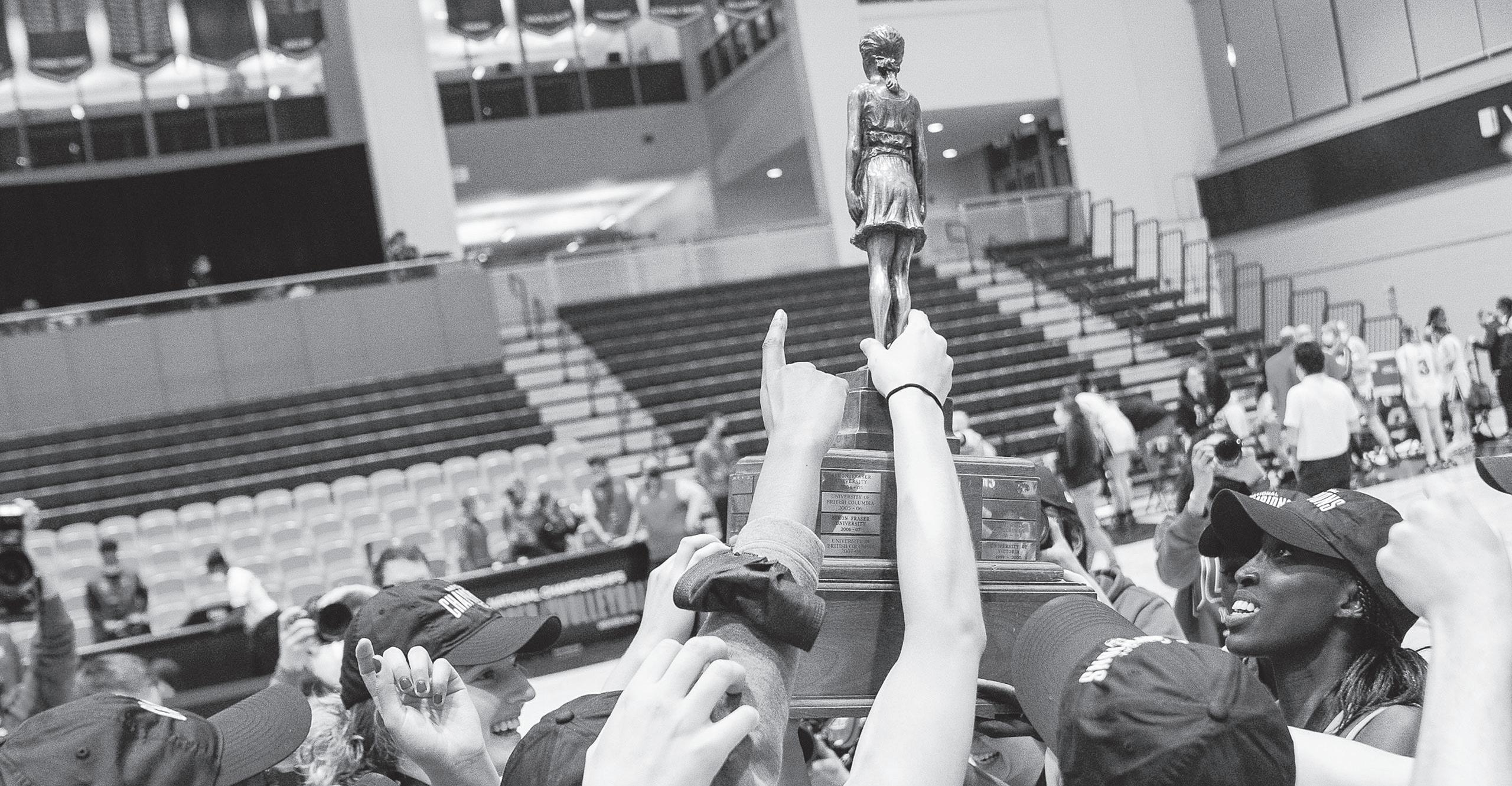
“We’ve just been building and learning so much, especially from the older girls”
“That was one of the reasons I came here—to win championships”
“It’s the culture of the last ten seasons of what we’ve been building”
You know that horrible feeling of having to listen to every single sound with no way to tune it out? This be came my sad reality. I didn’t expect my day to turn sour so quickly but it was just my luck that my beloved headphones decided they didn’t want to work and left me all alone with the unique sounds and conversations that Toronto had to offer. Having noth ing to listen to during my commute or whilst strolling from class, here is a recollection of my music-less day— from heading to class and then to my photo editing responsibilities at The Eyeopener office.
Time: 7:50 a.m.
Location: Newmarket GO station, platform one
Sitting in the top deck—the silent zone— is always my go-to. To my surprise, an entire school field trip has already con quered the top deck. Despite that, I’m quick to find an empty seat. At least I have my noise cancelling headphones to drown out these little tyrants disobey ing the WRITTEN silent rule—or so I thought. I put my headphones on and played my usual loud rock music, ensur ing that the outside voices won’t bleed into my listening experience.
Time: 8:25 a.m.
Location: Still on the train
My worst nightmare occurs in which the saviours defending my ears from the real world—my trusty head phones—die. I scramble through my bag for my backup headphones, un able to find them in the sea of old receipts, crusty coins and discarded doodles that litter my bag. Hope is quickly lost. Accepting my reality, I mentally prepare for the second half of my commute to be filled with the raw, unfiltered sounds of children screaming about Fortnite and obscure internet references that I won’t un derstand (insert sad face emoji).
Time: 8:54 a.m.
Location: Line 1, Union Station
As I waited for the subway, like clock work a gust of wind hits my face and the shrill shriek subway wheels grind ing against the track rings so loud that even my noise-cancelling headphones probably wouldn’t mask it. Finally I get on the subway onwards to campus.
Time: 8:55 a.m.
Location: Line 1, King subway station
I tried to turn on my headphones in hopes that they have found it in their good soul to have five minutes of energy. That’s all I need! They con nect, I press play, they disconnect. Damn, I really thought they changed their mind. Guess my headphones are teaching me a lesson today. They’ve noticed that I’ve been enjoying my commute too much, this is a punish
ment, it has to be! I digress—there’s nothing that I can do at this point.
Time: 9:01 a.m.
Location: Tim Hortons, YongeDundas Square
I can’t even make up what happened on the train.
“The house party last night got so wild that the floor caved in. OMG but she didn’t move because the beer pong game was too important!”
Wild. The frat party last night sounded reckless and filled with disgusting details that I wish I never heard about.
Time: 9:08 a.m.
Location: Yonge-Dundas Square theatre building
While I was waiting for my sausage
farmer’s wrap, the two towering suitclad boys in front of me had a very interesting conversation. Apparently, the third floor is talking about rear ranging management and they both want to be the boss.
Brad: So did you hear they’re re-ar ranging management?
Chad: Yeah, I’m thinking of applying for the new position. Maybe I’ll even become your boss!
*both chuckle nervously*
Brad: You know...I was, uh, also thinking of applying... Chad: Oh…

Only good thing to come out of today—I love drama and seeing cor porate Chads and Brads at their low est! Walking away from the Dundas building, everything hits at once and suddenly my own thoughts can’t
seem to form—where is that darn creepy horror music coming from?
I feel like plugging my ears with my fingers sometimes. UHG, that’s what my headphones are supposed to do!
Time: 9:10 a.m.
Location: Victoria Street
Campus is a quiet place in compari son to Yonge-Dundas square. There are pigeons squawking and leaves crunching. The majority of people walk alone and those with friends are not too loud. It’s quite peaceful.
Time: 11:34 a.m.
Location: Eyeopener Office Desk
I sit in the silent office after my class, fearing my travels home. Shall I con template going to Dollarama to buy a charger? But alas, I will have to walk
past the busy street and so many peo ple. I grab my bag and as I’m grasp ing for the zipper, that’s when I see it, like a spotlight—the charging cord. My eyes started watering. Is this true happiness? I stare at my headphones and slowly plug them in to see the lit tle orange light blinking back at me.
Time: 6 p.m.
Location: Line 1, Dundas subway station
As I write this in peace, there are no kids, no Brads, no Chads and certain ly no frats—just me and Spotify. My headphones really put me through it today but now I learned my les son: listening to Toronto sucks and I should always keep several backups because this day is not one I want to experience again.








